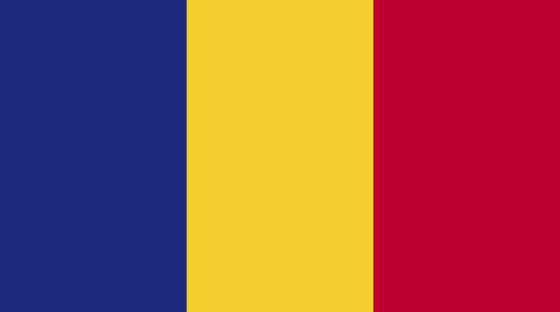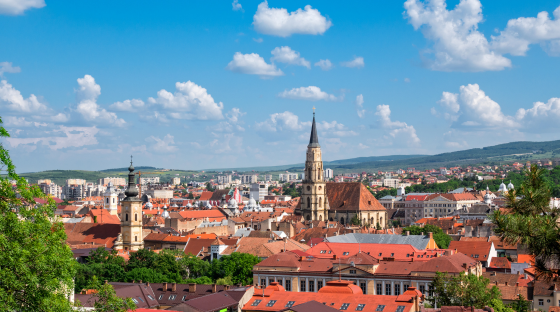Romania

Overview
In Eastern Europe, Romania has established itself as the country most culturally aligned with the United States. A member of the European Union since 2007, its entrepreneurial environment makes it a hotspot for software outsourcing, app development and tech research. The capital Bucharest, Cluj-Napoca and Iasi have become tech hubs, contributing significantly to the country’s economy.
Romania’s economy has withstood significant adverse shocks in the wake of Russia’s invasion of Ukraine and the ensuing energy crisis. A recent Economist Intelligence Unit report describes it as “a bright spot on a rather dismal European landscape” and expects economic growth to remain strong by EU standards through to 2028.
The tourism sector has become one of the most important contributors to a country’s growth and economic development, accounting for almost 5% of GDP in 2024. Romania has several world heritage sites protected by UNESCO, including the Churches of Moldova, Maramures, Transylvania, several Dacian Fortresses, and the Danube Delta.
The Accelerance Global Network is the most curated list of high-quality global teams ever assembled.
1000
Developers
Total number of developers in our certified partner network by country
2
Certified Partners
Total number of certified partners in our global network by country.
11hrs
Time Travel (From NY)
Average flight time from NY to the major cities in the country.
57
Partner Innovation capability
The score reflects investment in STEM progrms and IT funding by country.
86
Partner Skill Level
Level of workforce skills and quality of education, including factors such as digital literacy, interpersonal skills, etc.
52
Partner Global Competitiveness
National productivity based on 12 core pillars, including government policy, infrastructure, economic stability, etc.
Medium
Software Outsourcing Readiness
Overall rating, based on the maturity of the tech sector, socio-political conditions, and on-the-ground research by Accelerance.

Talent Pool & Education
Home to more than 200,000 developers, Romania’s technology sector has been experiencing steady growth, contributing around 6.2% of the GDP in 2024. ICT exports are predicted to significantly increase over the next few years to an estimated $9.3 billion by 2026. The country's EU membership played a significant role in catalyzing its IT branch, attracting global giants such as Huawei, Hewlett-Packard, Ericsson, and Adobe to set up operations here.
Romania’s strong position as an outsourcing destination is further evidenced by its ranking at 30th in the Kearney Global Services Location Index, gaining a higher score than many European countries, including Ireland and the Netherlands. The index assesses countries as offshore locations for business services, taking into account factors such as labor and infrastructure costs, available skills, quality of services provided, infrastructure, business environment, and political and social risks.
In mid-2024, Romania’s minister of digitization, Bogdan Ivan, announced that government cloud services should be operational by early 2025. Eighteen ministries and government agencies will also benefit from a €20 million investment to automate data processing as part of a broader strategy to enhance the country’s IT framework.
Language
The official language is Romanian; however, a very high percentage of the workforce speaks English, French, German or Italian. Romanian is the only Romance language that prevailed in Eastern Europe, with only 10% of its vocabulary deriving from the country's Slavic roots.

Economic Outlook
Romania has made considerable progress in economic performance and convergence with the European Union, but faces challenges in fostering growth that is more inclusive and sustainable, both economically and environmentally. Financial conditions are expected to ease and public investment to remain robust, but external demand from main EU trading partners was weak through the first half of 2024.
Following relatively muted real GDP growth of 2.1% in 2023, the European Commission expects the economy to accelerate throughout 2024 supported by domestic demand benefiting from rising disposable incomes, and EU-financed investment. However, strong growth means that inflation, while trending downwards, will remain elevated. A political commitment to raise the minimum wage, which would affect more than a third of employees, will also create upward pressure on the economy.
A burgeoning tourism sector has rebounded to exceed pre-pandemic levels, and the capital Bucharest is emerging as a popular city-break destination. Romania is one of the most affordable countries in Europe for travel, and one of the safest.
Political Conditions
Following parliamentary elections in late 2024, pro-European parties agreed to form a governing majority and potentially endorse a single candidate in new presidential elections set to take place in the first half of 2025, after the first round's results were annulled over concerns about Russian meddling.
Extreme tendencies are strengthening in Romanian society, as seen in increasing support for the far-right parties that now make up 30% of parliament. The new coalition government of the National Liberal Party (PNL), centrist Save Romania Union (USR), and the center-right Democratic Alliance of Hungarians in Romania (UDMR) has put policy differences aside to act as a bulwark against the far right’s advance. Soon after forming, a statement from the coalition stated its aim “to build trust in institutions and the political class through good governance, transparency in public spending and respect for citizens."
Political satisfaction from the population is low, with nearly 70% of Romanians polled in late 2023 believing the country is headed in the wrong direction. A 2023 Corruption Perception Index report ranked Romania the third worst in the EU, behind Hungary and Bulgaria.Capitalizing on public discontent, the most prominent right-wing party has begun adapting its narrative in a bid to attract more moderate voters.
In the first round of the presidential election, far-right nationalist Călin Georgescu appeared to secure an emphatic victory. The result was a shock as most predictions indicated he had about 5% support. The result was annulled after the Romanian intelligence services released evidence that showed a "state actor" – presumed to be Russia – artificially propped up Georgescu's victory with a campaign on the video-sharing app TikTok.
Learn more about our customer stories.
Looking for a customer story in a specific technology or industry? Discover compelling customer narratives within a specific technology or industry that resonate with your unique software development needs.


.png?width=300&name=Copy%20of%20WEBSITE%20Stop%20Chasing%20Low%20Hourly%20Rates%20Unlock%20the%20True%20Value%20of%20Offshore%20Development%20(450%20x%20253%20px).png)



